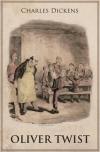Boekenkast

Oliver Twist
Auteur | Charles Dickens |
Eerste Uitgave | 1838 |
Uitgave | 1996 |
Uitgeverij | Kindle |
Vorm | roman |
Taal | Engels |
Bladzijden | 268 bladzijden |
Gelezen | 2013-10-14 |
Score | 8/10 |
Inhoud
An absorbing mystery as well as a morality tale, the story of Pip, a poor village lad, and his expectations of wealth is Dickens at his most deliciously readable. The cast of characters includes kindly Joe Gargery, the loyal convict Abel Magwitch and the haunting Miss Havisham. If you have heartstrings, count on them being tugged.
Bespreking
Strong social engagement
The story of Oliver Twist is quite famous and probably does not need much introduction. The setting is 1830’s London and this is crucial to understanding the meaning of this novel, which was originally published in monthly installments.
After the death of his mother, Oliver is pulled through the support system initiated by the Poor Law Act of 1834. He starts at a workhouse and moves thereafter to many other situations that showcase the extremes of the English society of that time. Oliver himself is a rather bland personification of all traits that are good in a boy. In many chapters he is depicted like something that is very close to an angel. This is in strong contrast to the other colorful characters who have no troubles flaunting their vices. At certain points in the novel it becomes overtly obvious that Dickens used this boy to as a point of contrast to what the world was turning to. Even the people who seem to mean well, turn out to own rather unstable moral views.
Without a minimum of understanding of how society in the 19th-century worked, Oliver Twist might read like a long-treaded account of a boy’s misfortunes. But with a little more insight (much aided by the SparkNotes-website) it becomes obvious that this work’s strongest asset is its social criticism. Through some beautiful examples of vicious sarcasm Dickens succeeds very well in weaving a layer of involvement through the narrative that surely will have engaged many readers at its first release.
In current times all these messages will seem outdated and irrelevant. Nevertheless I am convinced that Dickens’ view on human nature can still very much resonate with the alert, modern reader.